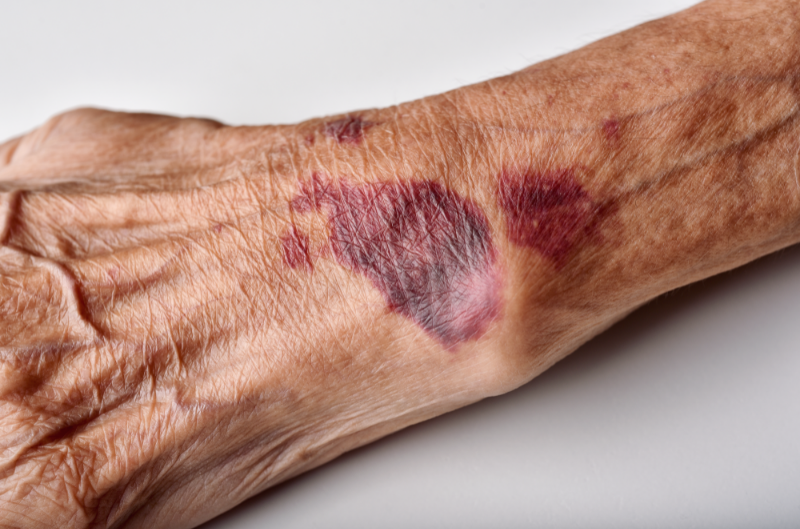What is Elder Abuse?
Elder abuse is the physical, emotional and financial mistreatment of older adults.
It’s estimated that up to 5 million people in the United States aged 60+ experience elder abuse annually.
Commonly, abusers are family members, namely older children and spouses.
But older adults can also face abuse from other caregivers, friends and authority figures.
There are 6 types of elder abuse, and a person can experience multiple simultaneously.
Read on to learn about elder abuse, how to spot elder it, and how to handle it.
What are the Different Types of Elder Abuse?
Physical Abuse
Physical elder abuse is intentional bodily harm caused by hitting, pushing, and forced confinement, etc.
It also includes misuse of medication.
Both over-medicating (to make someone more “agreeable” or passive) and under-medicating/not providing required medication are considered physical elder abuse.
Signs of Physical Abuse
- Cuts
- Burns
- Bruises
- Restraint marks
- Broken glasses
- Black eyes
Emotional Abuse
Emotional abuse (aka psychological abuse) is the deliberate act of trying to belittle, scare and isolate someone.
Emotional abuse of an older person may include yelling, name calling and threats (of violence, abandonment, etc.).
It can also include constant put-downs, such as demeaning someone’s appearance, abilities or interests.
Emotional abusers may also try to isolate older people from their friends, family and social groups.
Humiliation, infantilizing (treating an adult like a child) and ignoring/giving the “cold shoulder” are also emotional abuse.
Signs of Emotional Abuse
- Agitation
- Social withdrawal
- Depression/anxiety
- Uneasiness around certain people
- Signs of distress, like rocking back and forth
- Self harm
- Changes to sleep and eating habits
Neglect
When a caregiver fails to meet an older person’s basic, physical and psychological needs, it’s called neglect.
Basic needs are those necessary for survival, like shelter, food, water and clothing.
Physical neglect happens when a caregiver doesn’t provide medication, medical services, hygiene upkeep, or a sanitary/safe living environment.
Psychological neglect occurs when someone is left alone for long periods. Resources that allow an older person to thrive, like social activities and important information, may be withheld.
Signs of Neglect
- Poor hygiene, like dirty clothes and unwashed hair
- Untreated or worsening medical conditions
- Unsafe housing (poor accessibility, structurally unsafe, health hazards like mold)
- Inappropriate clothing for the weather
- Infestations, like mice or bugs
- Absence of necessary medical aids, like glasses, wheelchair, dentures, etc.
Abandonment
Elder abandonment occurs when someone has assumed care for an older person, but then leaves permanently without planning for their care.
People may be abandoned:
- At their home
- With family/friends
- At a hospital or nursing home
- At a public location
Signs of Abandonment
- Being alone
- Confusion (especially if the person has an illness like Alzheimer’s)
- Self-neglect
- Depression
Sexual Abuse
Sexual abuse is any type of sexual contact or behavior that occurs without consent.
This type of abuse exists on a spectrum:
- Unwanted sexual comments and jokes
- Unwanted touching
- Ignoring a senior’s changing mental needs when having sexual contact
- Using sex as a weapon
- Forcing sex with self and others
- Forcing others to watch explicit sexual content
- Viewing an older person as a sex object (ogling, demanding sex, etc.)
Signs of Sexual Abuse
- Personal reports of sexual assault and rape
- Bruising around genitals and breasts
- Unexplained sexually transmitted infections
- Torn or bloody underwear and bedding
- Unexplained vaginal or anal bleeding
Financial Abuse
Financial abuse is misuse or theft of cash or belongings. It can include forging checks, taking retirement savings, accessing bank accounts and using credit cards without permission.
Financial abuse also includes financial neglect, exploitation and health care fraud.
Financial neglect happens when a caregiver doesn’t manage an older adult’s expenses (mortgage, utilities, insurance, etc.), despite them having the funds available.
Financial exploitation is the misuse of assets and belongings without permission, or by force/manipulation (e.g., changing names on a will or house title, accessing investments, etc.).
Health care fraud happens when medical providers overcharge, intentionally double bill, charge for services that weren’t rendered, or submit false Medicaid or Medicare claims.
Signs of Financial Abuse
- Unpaid necessary expenses
- Eviction notices
- Suspicious credit card activity
- Missing legal documents, like wills and house titles
- Large sums of money being withdrawn from bank accounts
- Missing valuables, like jewelry
How to Help Someone Experiencing Elder Abuse
For many older adults, discussing their experience of elder abuse can cause feelings of shame and fear.
They may worry that the information will get back to their abuser and worsen the situation.
For this reason, it’s best to approach the situation with empathy and sensitivity.
If you’re concerned that someone you care about is the victim of abuse, gently express concern for their wellbeing. In a private, one-on-one setting, ask:
- How they’re doing
- How things are going at home/in their personal lives
- If there’s anything you can do to support them
- If there’s anything they need
If they confide that they’re being abused:
- Believe them and don’t deny their experience
- Listen patiently
- Don’t blame them for their circumstances
- Don’t confront the abuser directly
- Encourage them to seek help in a caring, non-pushy way
- Research available resources
Elder abuse is a common yet often unreported occurrence.
Abusers take advantage of vulnerable older adults, often causing physical, mental, and financial damage.
Each person, no matter how old, deserves safety from harm.
That’s why it’s important to be informed about elder abuse.
Know the signs, so you can help protect older adults and ensure they live with dignity and respect.
For help and information, contact:
National Adult Protective Services Association
202-370-6292
www.napsa-now.org
National Center on Elder Abuse
855-500-3537
ncea-info@aoa.hhs.gov
https://ncea.acl.gov
National Domestic Violence Hotline
800-799-7233 (24/7)
800-787-3224 (TTY)
www.thehotline.org/get-help
National Elder Fraud Hotline
833-FRAUD-11 for 833-372-8311
https://stopelderfraud.ovc.ojp.gov
U.S. Department of Justice
202-514-2000
800-877-8339 (TTY)
elder.justice@usdoj.gov
www.justice.gov/elderjustice
www.justice.gov/elderjustice/roadmap

